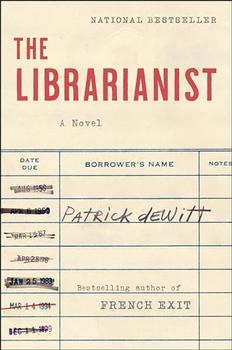Summary | Excerpt | Reviews | Beyond the Book | Readalikes | Genres & Themes | Author Bio

A Novel
by Patrick deWitt
BOB TELEPHONED THE AMERICAN VOLUNTEER ASSOCIATION THE NEXT morning and later in the week received a packet in the mail, color brochures featuring pictures of glad seniors, glad people in wheelchairs. The text was highly praiseful and petting of Bob's decision to lend a hand, but there was a hitch, which was that he had to be vetted before the AVA welcomed him officially into the fold. Saturday morning and he drove to a storefront on Broadway that specialized in such things as passport photos and notarizations and fingerprints, the last being what he was after. His prints were sent off to what he imagined was a subterranean robot cityscape, a bunker database where they kept the shit list under dense glass, to check his history for uncommon cruelties, irregular moralities. He didn't expect there to be an issue and there wasn't, but he did feel a doubt reminiscent of his experience of passing through the exit barriers at the pharmacy and wondering if the security alarm would sound even though he'd not stolen anything.
Bob had not been particularly good or bad in his life. Like many, like most, he rode the center line, not going out of his way to perform damage against the undeserving but never arcing toward helping the deserving, either. Why now, then? He himself didn't know for certain. The night before his first official visit to the center he dreamed he arrived and was greeted in the same garrulous, teasing manner as the man with the big beret had been. The scene of group acceptance was heady, but when Bob stepped into the center the next morning no one acknowledged his presence. "Hello," he said, but nobody so much as glanced at him, and he understood he was going to have to work his way toward visibility, to earn the right to be seen by these people, which he believed was fair, and correct.
Bob sought out Maria, who sat talking on the phone in her small, untidy office. She pointed Bob toward the rear of the Great Room and gave him a goodwill thumbs-up; soon he was standing at a podium before an audience of twenty souls. He briefly introduced himself and the chosen text; since this first appearance took place some days before Halloween, he'd decided to begin with a short story by Edgar Allan Poe, "The Black Cat." The reading was going well enough when on page three the cat had its eye cut out with a penknife by its owner, and a third of Bob's small audience left the room. On page four, the same unlucky cat was strung up by its neck and hung from the branch of a tree, and now the rest of the crowd stood to go. After the room emptied out a muttering janitor came in with a hand truck and began folding and stacking the chairs. Maria approached Bob with an I-told-you-so expression on her face. "I told you so," she said.
Bob walked home through the October weather. A stream of leaves funneled down the road and pulled him toward his mint-colored house, the location of his life, the place where he passed through time, passed through rooms. The house rested in the bend of a quiet cul-de-sac, and it was a comfort for him whenever he came upon it. It didn't reflect worldly success, but it was well made and comfortably furnished and well taken care of. It was a hundred-odd years old, and his mother had purchased it from the man who'd built it. This man had gone blind in his later years and affixed every interior wall with a length of thick and bristly nautical rope run through heavy brass eyelets positioned at waist level to guide him to the kitchen, to the bathroom, the bedroom, up the stairs and down, all the way to the workshop in the basement. After this person died and the property changed hands, Bob's mother did not remove the rope, less an aesthetic choice than obliviousness; and when she died and Bob inherited the house, he too left the rope in place. It was frayed here and there, and he sometimes banged his hip on the eyelets, but he enjoyed the detail for its history, enjoyed the sight of it, enjoyed the rope's prickliness as it ran through his hand.
Excerpted from The Librarianist by Patrick deWitt. Copyright © 2023 by Patrick deWitt. Excerpted by permission of Ecco. All rights reserved. No part of this excerpt may be reproduced or reprinted without permission in writing from the publisher.
Your guide toexceptional books
BookBrowse seeks out and recommends the best in contemporary fiction and nonfiction—books that not only engage and entertain but also deepen our understanding of ourselves and the world around us.